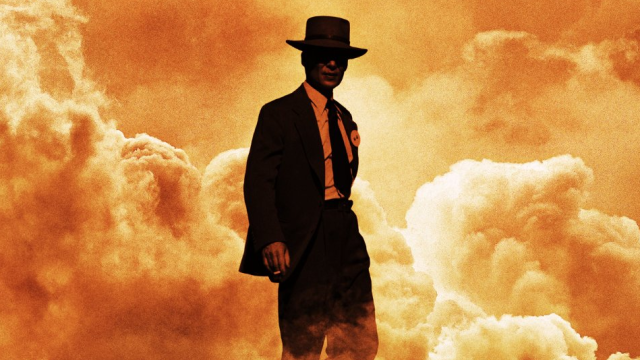This Week This Will Drop on You:
- labor history
- long movies
- free movies
- cop rock (lowercase)
- da bomb!
Thanks to scb0212 and C.M. Crockford for blowing up our inbox. Send articles throughout the next week to ploughmanplods [at] gmail, post articles from the past week below for discussion, and Have a Happy Friday!
As the entertainment labor strikes continue, our own C. M. Crockford writes in Cinespeak about the history of Philadelphia’s film labor through celluloid fires and uneasy alliances:
Still, even if Philadelphia has historically been a hub for filmmaking, the city is often a challenging place for film crew workers. The work isn’t as consistent as it is in some other cities, especially compared to the West Coast, where it’s cheaper and easier to shoot. The unions are led by non-Philadelphians, who may have different priorities than the workers here. Plenty of producers also have a bad impression of the local union workers and prefer to shoot elsewhere. But many of the problems with film production in the City of Brotherly Love–and in East Coast filmmaking as a whole–were there a hundred years ago as well. Ultimately Philadelphia’s film labor efforts involve a tantalizing series of knowledge gaps, what-ifs, frustrations, and plans that never came to fruition.
On the eve of Oppenheimer, rogerebert[dot]com looks back at the site’s reviews by Ebert and others of Christopher Nolan’s work through the years (all thumbs up):
The movies often seem to come from the recycling bin these days: Sequels, remakes, franchises. “Inception” does a difficult thing. It is wholly original, cut from new cloth, and yet structured with action movie basics so it feels like it makes more sense than (quite possibly) it does. I thought there was a hole in “Memento:” How does a man with short-term memory loss remember he has short-term memory loss? Maybe there’s a hole in “Inception” too, but I can’t find it. Christopher Nolan reinvented “Batman.” This time he isn’t reinventing anything. Yet few directors will attempt to recycle “Inception.” I think when Nolan left the labyrinth, he threw away the map.
At Vanity Fair, Natalie Jarvey investigates the question “Why Are Movies Sooooo Long?”
To put it bluntly, as one top agent does, “Because producers have gotten so short.” As the sun set on superproducers like Harvey Weinstein—nicknamed “Harvey Scissorhands,” because he cut the movies he produced with relish—no one rose to take their place. “The ability to work hand-in-glove with a world-class director to shape a movie, very few producers possess that skill or willingness today,” the agent says. Directors, to extend the metaphor, are getting taller. There are only so many proven hitmakers, but the list of buyers keeps growing with Netflix, Amazon, Apple, and others jumping into the original-film game. On streaming, you don’t have to worry about movie theater showtimes or bathroom breaks—that’s what the pause button is for. Executives are still incentivized to make the best possible movie, but the conversation is a little different if a filmmaker feels strongly that they need those extra five (or 30) minutes. That’s put pressure on the studios to cave to a singular director’s vision. Who wants to be the executive who says no to Scorsese and loses him to Netflix? (Of course, he might still go there anyway—and then jump to Apple.)
Justin Beckner posts at Ultimate Guitar about the source and the future echoes of a Dead Kennedys song:
The Dead Kennedys song “Police Truck” was a visceral commentary on the police corruption that was running rampant in the late ’70s and early ’80s. The initial inspiration for the song was a real incident that occurred in Oakland, California, just across the bay from where the band was based out of San Francisco. Allegedly, the officers would drink on the job, beat up drunk people, and abduct and rape prostitutes during the night shift in the back of a police surveillance truck. The song was sung from the perspective of the officers involved, bragging to their buddies about their actions. The song was also a blanket statement about police brutality and officers who abuse their power, which was tragically commonplace back then, especially in the Bay area where the Dead Kennedys were based.
And finally, if you’re too strapped to participate in the Barbenheimer weekend, Natalia Keogan and Scott Macaulay spotlight 25 Great Independent Films You Can Stream Free on Tubi (aka The People’s Channel):
The Day of the Beast: Spanish director Álex de la Iglesia’s 1995 black horror-comedy revolves around the exploits of an unconventional Galician priest to thwart the birth of the Antichrist on Christmas Eve. His plan? To commit as many sins as possible throughout Madrid—petty theft, assault, drug use, etc.—so that he may prove his commitment to Satan and sell his soul, thus allowing him into the birthing ceremony where he’ll be able to kill the devil spawn as quickly as possible. Witnessing a priest trip on acid and push over unwitting street performers is an entertaining enough conceit on its face, but de la Iglesia’s film (co-written by him and Jorge Guerricaechevarría) is most engrossing when showcasing its use of practical effects, which are incredibly startling in their uncanny stop-motion aesthetic. Previously unavailable to stream, it’s a must-watch for lapsed Catholics, avid occultists and horror hounds alike.


